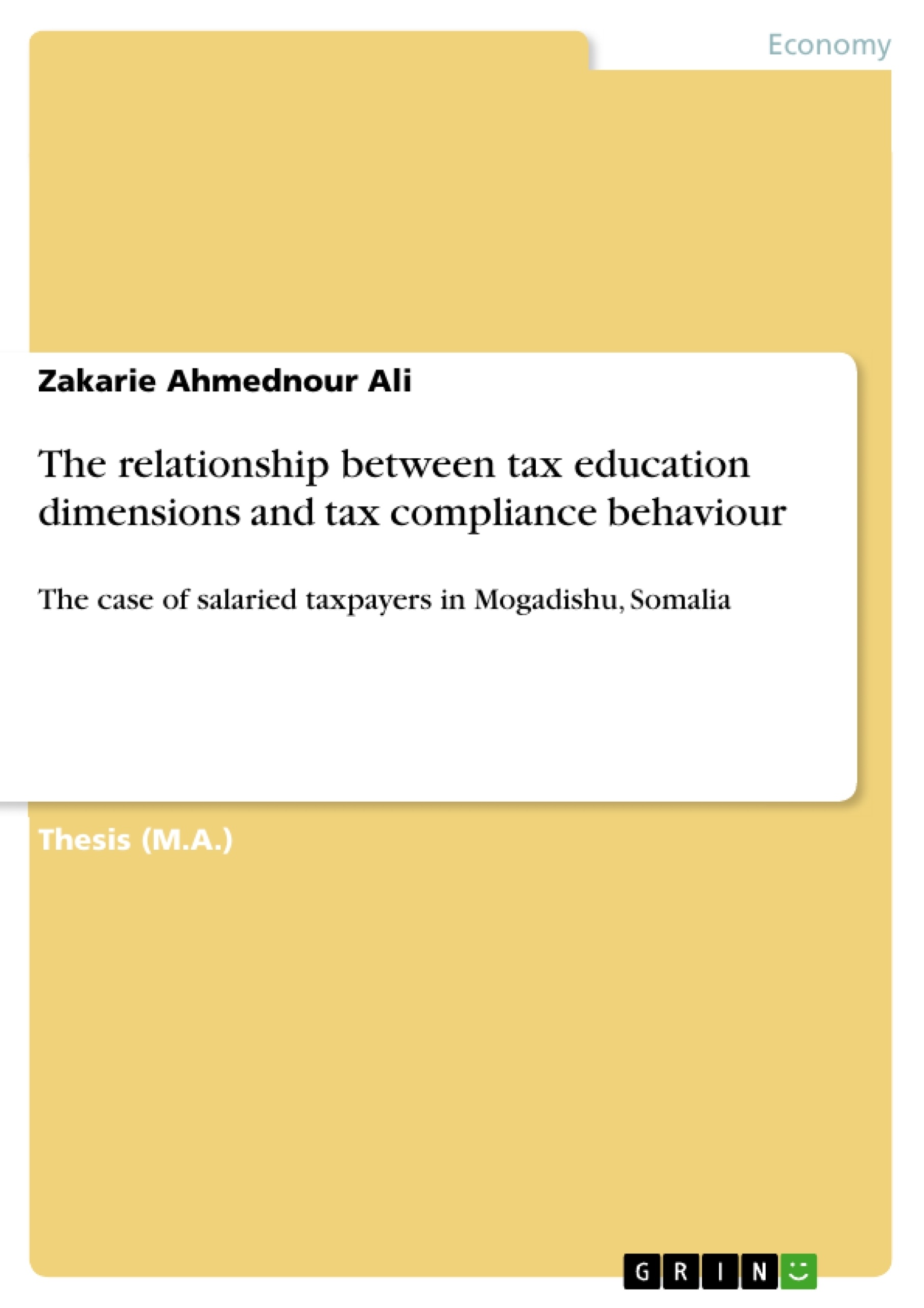This study investigates the relationship between tax education dimensions and tax compliance behaviour among salaried taxpayers in Mogadishu, Somalia. This study is motivated by low tax compliance and low tax education in Somalia.
Specifically, the objectives of this study were to examine the relationships between efforts for tax learning, awareness of tax laws and understanding of tax laws; and tax compliance behaviour among salaried taxpayers in Mogadishu, Somalia.
To achieve the research objectives, primary data were collected through administrating survey questionnaires to salaried taxpayers in Mogadishu, Somalia. The data were analysed using multiple regression analysis.
The findings of the study indicate that efforts for tax learning had a negative and significant relationship with tax compliance behaviour. On the other hand, the awareness of tax laws and understanding of tax laws had a positive and insignificant relationship with tax compliance behaviour. Efforts for tax learning contributes the most towards tax compliance behavior.
Therefore, the policymakers in Somalia should focus more on the most important contributing factor, i.e. efforts for tax learning, to enhance tax compliance and ultimately mitigate the problem of noncompliance in Somalia.
Inhaltsverzeichnis (Table of Contents)
- ABSTRACT
- ABSTRAK
- ACKNOWLEDGEMENTS
- CHAPTER 1: INTRODUCTION
- 1.1 Background of the Study
- 1.2 Problem Statement
- 1.3 Research Objectives
- 1.4 Research Questions
- 1.5 Significance of the Study
- 1.6 Scope of the Study
- 1.7 Limitation of the Study
- 1.8 Definition of Terms
- CHAPTER 2: LITERATURE REVIEW
- 2.1 Introduction
- 2.2 Tax Compliance Behaviour
- 2.3 Factors Influencing Tax Compliance Behaviour
- 2.4 Tax Education
- 2.5 Tax Education and Tax Compliance
- 2.6 Empirical Evidence on the Relationship Between Tax Education and Tax Compliance
- 2.7 Summary
- CHAPTER 3: RESEARCH METHODOLOGY
- 3.1 Introduction
- 3.2 Research Design
- 3.3 Population and Sample
- 3.4 Data Collection
- 3.5 Data Analysis
- 3.6 Ethical Considerations
- CHAPTER 4: FINDINGS AND DISCUSSION
- 4.1 Introduction
- 4.2 Data Analysis and Results
- 4.3 Discussion of Findings
- 4.4 Summary of Findings
- CHAPTER 5: CONCLUSION AND RECOMMENDATIONS
- 5.1 Introduction
- 5.2 Conclusion
- 5.3 Recommendations
- 5.4 Limitation of the Study
- 5.5 Future Research
- REFERENCES
- APPENDICES
Zielsetzung und Themenschwerpunkte (Objectives and Key Themes)
This research aims to examine the relationship between tax education dimensions and tax compliance behaviour among salaried taxpayers in Mogadishu, Somalia. The study is motivated by low tax compliance and low tax education in Somalia. Specifically, it explores the relationships between efforts for tax learning, awareness of tax laws, and understanding of tax laws; and tax compliance behaviour.
- Tax Compliance Behaviour
- Tax Education
- Efforts for Tax Learning
- Awareness of Tax Laws
- Understanding of Tax Laws
Zusammenfassung der Kapitel (Chapter Summaries)
- Chapter 1: Introduction This chapter provides background information on the study, outlines the problem statement, research objectives, research questions, significance of the study, scope, limitations, and definitions of key terms. It sets the stage for the research by establishing the context, rationale, and objectives.
- Chapter 2: Literature Review This chapter reviews relevant literature on tax compliance behaviour, factors influencing tax compliance, tax education, and the relationship between tax education and tax compliance. It summarizes existing research and theories to provide a foundation for the current study.
- Chapter 3: Research Methodology This chapter describes the research design, population, sample, data collection methods, data analysis techniques, and ethical considerations. It outlines the methodological approach used to conduct the study and ensure its rigor.
- Chapter 4: Findings and Discussion This chapter presents the findings of the data analysis and discusses their implications. It interprets the results in light of the research questions and existing literature.
Schlüsselwörter (Keywords)
This research focuses on tax compliance behaviour, tax education, efforts for tax learning, awareness of tax laws, and understanding of tax laws in the context of Somalia. It examines the relationship between these factors to understand the determinants of tax compliance in a developing country.
- Citation du texte
- Zakarie Ahmednour Ali (Auteur), 2017, The relationship between tax education dimensions and tax compliance behaviour, Munich, GRIN Verlag, https://www.grin.com/document/416801



